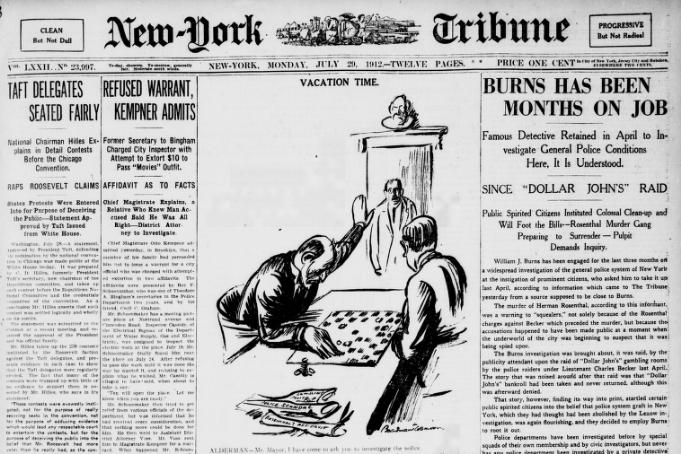|
Moderated by NW Okie! |
Volume 14 , Issue 312012Weekly eZine: (374 subscribers)Subscribe | Unsubscribe Using Desktop... |
1912 - Taft Delegates Seated Fairly

It was Monday, 29 July 1912, that the The New York Tribune proclaimed on the front page that "Taft Delegates Seated Fairly." The National chairman Hilles explained in detail contests before the Chicago convention and raps Roosevelt claims. States protests were entered into for purpose of deceiving the public and a statement was approved by Taft, issued from the White House.
Washington, July 28, 1912 -- The statement approved by president Taft, defending his nomination by the national convention in Chicago was made public at the White and prepared by C. D. Hilles, formerly president Taft's secretary, and chairman of the Republican committee, and took up each contest before the Republican National committee of the convention. Hilles asserted that each contest was settled logically and wholly on its merits.
The statement was submitted to the cabinet at a recent meeting, and received the approval of the President and his official family. Hilles took up the 238 contests instituted by the Roosevelt faction against the Taft delegates, and presented evidence in each case to show that the Taft delegates were regularly elected. The fact that many of the contests were trumped up with little or no evidence to support them was asserted by Mr. Hilles, who says in his statement which read:
"These contests were avowedly instigated, not for the purpose of really securing seats in the convention, not for the purpose of adducing evidence which would lead any respectable court to entertain the contests, but for the purpose of deceiving the public into the belief that Mr. Roosevelt had more votes than he really had, as the conventions and primaries were in progress for the selection of delegates."
The statement went on to state, "This is not only a necessary inference from the character of the contests, but it was boldly avowed by the chief editor of the newspapers owned by Mr. Munsey, who has been Mr. Roosevelt's chief financial and newspaper supporter. The 238 contests were reduced by abandonment, formal or in substance, to seventy-four. The very fact of these 164 frivolous contests itself reflects upon the genuineness and validity of the remainder. The seventy-four delegates include six at large from Arizona, four at large from Kentucky, four at large from Indiana, six at large from Michigan, eight at large from Texas and eight at large from Washington, and also two district delegates each from the 9th Alabama, the 5th Arkansas, the 13th Indiana, the 7th, 8th and 11th Kentucky, the 3d Oklahoma, the 2d Tennessee, and from each of nine districts, the 1st, 2d, 4th, 5th, 7th, 8th, 9th, 10th and 14th of Texas."
As to the Texas contests, there were 249 counties, o which four had no county government. The 245 counties under the call of the convention were allowed to have something over 1,000 delegates representing them, who were given authority to cast 248 votes. Of the 245 counties, there were 99 counties in which the total Republican vote was but 2,000. In fourteen of which there were no Republican voters. IN 27 of which there were less than 10 each, and in none of which was there any Republican organization, and in none of which had a primary or convention been held.
It was shown that Colonel Cecil Lyon, to whom had been assigned as referee the disposition of the patronage of the national Republican administration for ten years in the state, had been in the habit of controlling the Republican State Convention by securing from two federal office holders in each of these 99 counties a certificate granting a proxy to Colonel Lyon, or a friend of his, to represent the county, as if regularly conferred by a Republican county organization.
| View or Add Comments (0 Comments)
| Receive
updates ( subscribers) |
Unsubscribe
| © . Linda Mcgill Wagner - began © 1999 Contact Me | |
